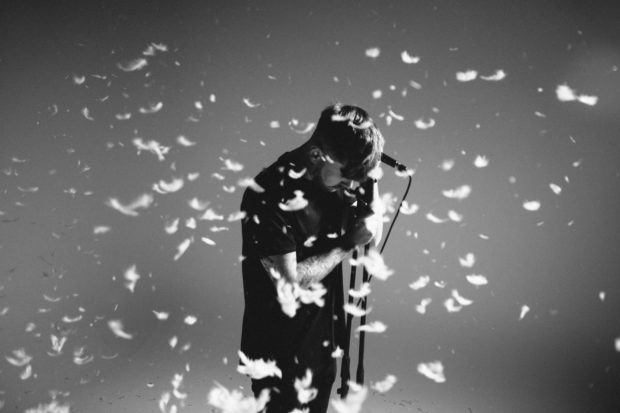You have no items in your cart. Want to get some nice things?
Go shopping
On a stage in a tent in a park, a band is playing. They are not the main act that day. The guitarist has dyed blonde hair and is wearing a black, figure-hugging outfit. She keeps grinning at the audience, while the other members look dour. The singer in particular does not look happy. His vocal style is to make a guttural sound from the front of his mouth and drawl the words. The music has a chugging beat with variations in tempo. I am 15.
Two years later I see them live again. I know their work better now. Their sound is like a bolt of energy matched by the growling surreal poetry of the lyrics. The singer has a strange way with words; they don’t make much sense but at the same time they flow perfectly with the music and stay with you.
After a decade of playing small clubs, releasing music on independent labels and airplay on late-night radio, finally they are getting mainstream recognition and the gig is in a medium-sized venue. But this step doesn’t suit them. It feels like they’re holding back and trying to control the more eccentric aspects of their characters. Success is stifling their creativity.
The next one is just a few months later and they have a ballet dancer on stage for some of the performance. It’s good that they’ve found their experimental side again but there is some laughter from the audience.
A year and a half after that I see them for the fourth time. I am 19. The guitarist has left and without her, some of the colour has gone from the band. There isn’t the same mix of interesting personalities on stage. The music has a darker edge and at the same time it’s more melodic.
Five years pass before the next time. The singer shuffles onto stage and it’s like seeing an old family friend who hasn’t been around for a while. His face is getting lined and his stage presence is less contrary; he seems more comfortable playing the part of the alternative entertainer. Surprisingly, the guitarist who had left has now returned. The split had been acrimonious so it’s strange that she’s come back, but welcome as her creative presence adds to the band.
Her stay doesn’t last long and by the time I see them for the sixth time, two years later, she has left again. This gig is in a small club and the band has two drummers and no guitarist. The music is relentless beats, not trying to please anyone. The singer doesn’t seem that interested. It’s art more than entertainment.
So, eight years pass and I am 34 when I attend another of their gigs. The musicians have all changed, and they are a lot younger than the singer. The new keyboard player stands at the front. She keeps her eyes down and occasionally adds vocals in a Germanic accent. She is a steadying force on stage.
The singer’s face has become gnarled and when he grimaces it creates an image which is more gargoyle than human. It’s common for people in entertainment to fight the ageing process, but he does the opposite and seems to be cultivating a look of inglorious decay.
He’s been leading this group for almost 30 years, and is widely seen as a literate and powerful creative force who cannot be compared to anyone else. He is disdainful of everything, including the success and praise he receives. He didn’t go to university. He didn’t do a course on how to be an alternative pop star, and there have been no big prizes.
With his band, he does what all great artists do; he shows his audience how to see the world in an original way; how to find magic in the mundane. And he does it with great wit; he mocks popular culture and people who want to be part of a herd. Listening to his work is liberating and makes me happy.
A year later I see them again for the eighth and final time. This gig is in another small club. Their low-key success never changed; big crowds and large album sales were not their aim. They were ambitious in a creative sense, always developing and pushing themselves artistically, but not commercially.
At this gig, I finally experience the moody side of the singer. He is not happy with something about the sound and he walks off after a few songs. The musicians carry on without him for a bit, then they also leave the stage.
More years pass and I am 47. I walk into the staff room of the school where I work. A newspaper is on the desk and on the front page is a photo of the singer. Under the picture it says, 1957 to 2018. And I wonder to myself how many times I saw him and his band live.

About Asim Rizki
Asim Rizki is the author of 'Year of The Scavenger'. He has worked as an English teacher in Tianshui, Jenin and Beirut. In the glory days of literary webzines, at the beginning of the century, his short stories were published in a few places.
- Web |
- More Posts(2)



